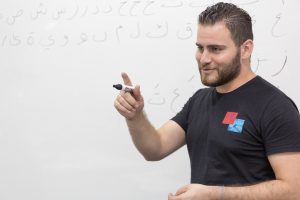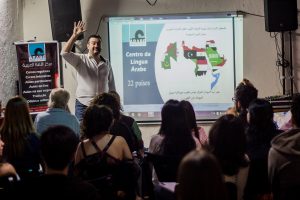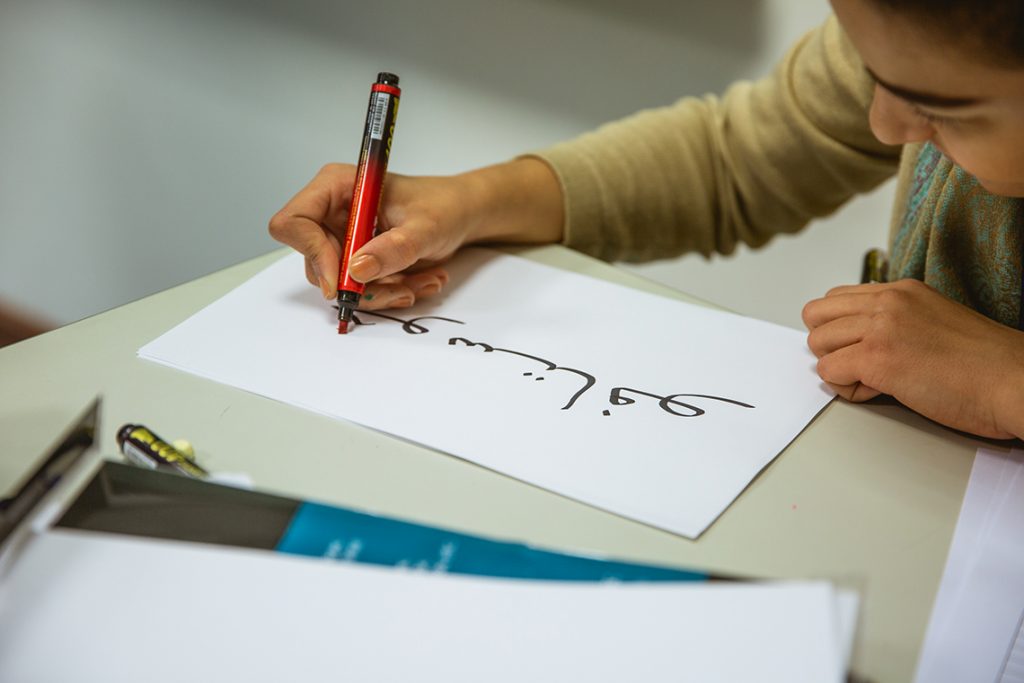São Paulo – More Arabic courses are available in São Paulo as asylum-seekers and migrants streamed in – particularly from Syria – in the past five years.
Schools include non-governmental organization Abraço Cultural (‘Cultural Embrace,’ in Brazilian Portuguese) – whose purpose is to enable refugees to share experiences, earn an income and be valued – and the Arabic Language Center established by Syria’s Mohamed Alsaheb. Native teachers can also be found online at Profes for private lessons.
Ten years ago, one of a handful of places offering Arabic classes in the city was the Syrian Arab Cultural Center, which closed its doors in 2015.
Abraço Cultural São Paulo executive director Mari Garbelini said that in 2019, the NGO had over 40 Arabic students, up from 36 in 2018 and 20 in 2014. Abraço also offers courses in Spanish, English and French with all-native migrant and refugee teachers. “We had two Arabic groups this semester, apart from private classes, up until level five. We have Syrian teachers, and next semester we’re planning to hire more,” said Garbelini. Abraço Cultural has existed for five years now.

Garbelini explains that since courses are available from more places, student demand at her school has remained steady. This year, the NGO doubled the size of its facilities, and she expects demand to go up again in 2020. “Soap operas like Órfãos da Terra [which aired on TV Globo from April to September] spark curiosity about the language and the culture. And now that O Clone is having a rerun on channel Viva [the show originally aired in 2001 and 2002 on TV Globo], we should see numbers go up again. Some of the students come from Arab families, or they need it for work, and some are just curious,” she said.
Ali Jeratli of Syria coordinates and teaches in the Abraço Cultural Arabic course. With a degree in Hospitality and Tourism, he moved to Brazil five years ago and has worked at the NGO for the last four. Currently, he also has an administrative job at the Consulate of Syria in São Paulo. “I switched careers because I wanted to show the Brazilian people good things about Syria, and Arabic is a very beautiful, very rich language. I want to see Brazilians speaking Arabic,” said Jeratli, who’s getting his Brazilian passport in two months. “I didn’t come as a refugee. I had resident status and now I’m becoming nationalized. I’m really glad I’m getting my papers,” he said.
United Nations High Commissioner for Refugees (UNHCR) public information advisor Miguel Pachioni concurs with Garbelini. “Course availability is on the way up, and so is the number of Brazilians interested in learning Arabic. And people are more accepting of the culture of those countries as well,” he told ANBA.
He said an emblematic case is that of teacher Mohamed Alsaheb, who founded the Arabic Language Center two years ago. “[The course] is an amazing idea. It involves a host of cultural and gastronomic elements in addition to the regular lessons. Language is a medium that goes along with an entire immersive culture. Calligraphy is another element which adds to the relevance of the writing. Alsaheb is a multifaceted artist,” said Pachioni.

Alsaheb moved to São Paulo as a refugee five years ago. The 38-year-old Damascus, Syria native has a degree in Advertising. He and fellow Syrian Yamam Saad teach classes at the school – plus another woman from Syria who’s a freelance teacher. The school had over 70 students in groups during the second semester this year, plus more than 20 adults and children taking private lessons in Arabic.
Alsaheb plans to expand further next year. “We’re opening a new unit near the metro station in the Paraíso area, a bigger place that can also accommodate cultural events. We hope to see over 100 students per semester,” he said. Enrolments are already open for intensive courses starting in January.
Marcelo Haydu, founder and director of NGO Instituto Adus told ANBA that although Arabic courses are no longer available, the organization still provides labor market training to refugees, and English classes taught by two Syrians and one Palestinian. “We’re getting lots more requests for Spanish, and since we’ve specialized in in-company lessons, we chose to shut down our Arabic course,” he said.
Founded in 2010, Instituto Adus de Reintegração do Refugiado (the Adus Refugee Reintegration Institute) is a public interest non-governmental organization which works with refugees and forced migration victims in São Paulo. The institute offers lessons in Brazilian Portuguese, labor market placement, and legal guidance, plus a language school where refugees teach English, French and Spanish.
The numbers
A refugee is defined as someone with a well-founded fear of being persecuted for reasons of race, religion, nationality, membership of a particular social group or political opinion, or widespread human rights violations, who’s forced to flee their country and seek asylum elsewhere.
The Brazilian Ministry of Justice and Public Safety’s National Committee on Refugees (Conare) ruled on 13,084 refugee status applications last year. It approved 777 applications – 476 from Syria, 52 from Palestine, 50 from Congo, 45 from Cuba, seven from MOrocco and five from Venezuela. Click here for the full list (in Brazilian Portuguese).
The Conare also granted refugee status extensions to 309 applicants – including 134 from Congo, 79 from Syria, 13 from Pakistan and 12 from Iraq. Newly approved and extended applications from Syrians amounted to 51% of total applications, at 555.
The number of people with refugee status in Brazil went from 4,035 in 2011 to 11,231 in 2018, but many have since changed status – by becoming naturalized Brazilian citizens, getting residency visas, returning to their countries of origin, or dying. At this time, Brazil is home to 6,554 refugees – 36% of whom are Syrian.
Translated by Gabriel Pomerancblum




